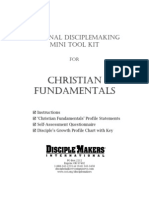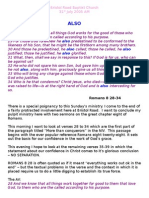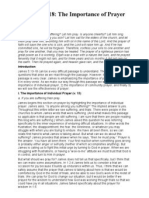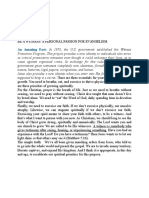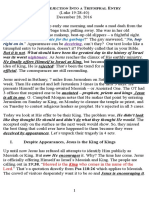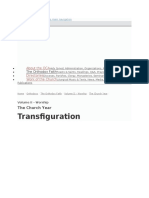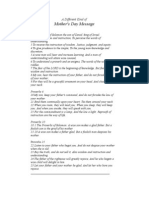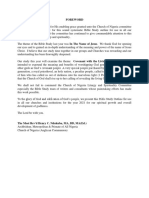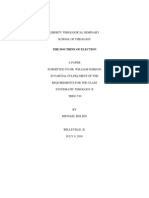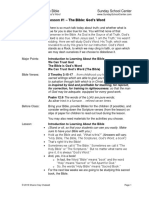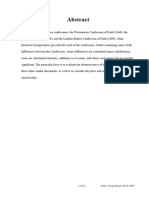Professional Documents
Culture Documents
Faith Without Works Is Dead
Faith Without Works Is Dead
Uploaded by
sarahlynn4790Original Description:
Original Title
Copyright
Available Formats
Share this document
Did you find this document useful?
Is this content inappropriate?
Report this DocumentCopyright:
Available Formats
Faith Without Works Is Dead
Faith Without Works Is Dead
Uploaded by
sarahlynn4790Copyright:
Available Formats
1
Faith Without Works is Dead: James 2:26
Belief in Christ, knowledge of the holy, and appreciation of His mercy and grace beckon
the transformed heart of the believer. The regenerate is not able to stand by idly as the world
around him is perishing, God never intended him to. Jesus satisfied the wrath of God for us and
if we have a changed mind about who He is and what He has done for us this will lead to a
changed life. 1 Peter 2:9-10 tells us:
But you are a chosen people, a royal priesthood, a holy nation, God’s special
possession, that you may declare the praises of him who called you out of darkness into
his wonderful light. Once you were not a people, but now you are the people of
God; once you had not received mercy, but now you have received mercy.
So, what are the responsibilities of the church and her believers now that we have come to an
accurate understanding of who God is? What does life after belief look like and what does God
want from us?
According to McGrath (2015) “the doctrine of the church continues to be an area of
discussion today, with particular emphasis being placed upon the role and tasks of local
churches” (p.396). As a firm believer that “reformed theology” is the only theology that preaches
a gospel that saves, and that Catholic’s preach “another Gospel” as stated by John Macarthur
(2020). I will steer clear of any Catholic doctrine contained within the text for the purposes of
not offending anyone. What I will say is that James 2:26 has caused a whole lot of contention
within the historic “church.”
So, what does it mean that “Faith without works is dead” and how does that pertain to our
responsibilities as Christians and the responsibility of the “church” as a whole? “Ecclesiology is
the section of Christian theology that deals with the nature and tasks of the church (Greek:
ekklesia)” (McGrath, 2016, p. 396). Vos (2016) says of believers that they “were all reckoned in
Christ, regenerated by the Spirit of Christ; they were all implanted into Christ in order to form
one body” (p.10). The Spirit of God is responsible for the sanctification and regeneration of the
believer, “justification “is not only a remission of sins but also the sanctification and renewal of
the inner person through the voluntary reception of the grace and gifts by which an unrighteous
person becomes a righteous person” (McGrath, 2016, p. 372). The Spirit of God empowers the
believer to become more and more “Christlike” during his life. Vos (2016) tells us the purpose of
this sanctifying work saying:
But the individual believer cannot remain by himself. The work of the application of the
merits of the Mediator also has a communal side. A root of unity is latent among those
individuals. This unity originates not only in retrospect but existed beforehand. Believers
were all reckoned in Christ, regenerated by the Spirit of Christ; they were all implanted
into Christ in order to form one body. (p.10)
This “body” of believers is what we commonly in Christianity refer to as “the church.”
If we look at James 2:26 and garner a “works” based salvation from these words, then we
have well and truly missed everything else the Bible has to say regarding salvation. If we look at
James 2:26 and see something that God has prepared for the life of the believer then we have a
truly right understanding of salvation. “This takes place in the doctrine of the church” (Vos,
2016, p. 10). By means of being crucified, buried and resurrected with Christ we are baptized
into a living, active body of believers all headed by the same Spirit. “By baptism a relationship to
2
the Church is represented and established. One is not baptized as a solitary individual but in
connection with the Church of Christ. Likewise, no one can hold the Lord’s Supper by himself
and for himself; the Supper refers to the communion of the saints” (Vos, 2016, p. 10).
If “we are God’s workmanship, created in Christ Jesus for good works, which God
prepared beforehand that we should walk in them” (Ephesians 2:10, NIV). Herein lies the
walking out of our Christian faith. These “good works are works done, not in our own strength
and for our own benefit but because of the renewed strength we find in God. James 2:14-26
defines what a “body” in motion looks like. If we have faith it creates motion. We are not meant
to become stagnant in our faith, we are meant to be soldiers in the army of the Most-High God.
We are to carry out the Great Commandment, it is what we were born (gennaó) to do.
References
McGrath. (2016). The christian theology reader, 5th edition (5th ed.). Wiley-Blackwell.
Vos, G. (2016). Reformed Dogmatics: Ecclesiology, The Means of Grace, Eschatology (R.
Gaffin, Ed.). Lexham Press.
Exposit the Word (2020, July 3). Is Roman Catholicism a cult? Is Roman Catholicism a cult? -
YouTube
You might also like
- Mark 11 Bible Study (Tim Keller) - The Final TempleDocument3 pagesMark 11 Bible Study (Tim Keller) - The Final TempleSisca HadinataNo ratings yet
- The Reason For God - The Problem of SinDocument2 pagesThe Reason For God - The Problem of SinDaveNo ratings yet
- Disciplers MinikitDocument8 pagesDisciplers MinikitreachtimNo ratings yet
- BOOK The Nine Days Novena To The Sacred Heart of JesusDocument30 pagesBOOK The Nine Days Novena To The Sacred Heart of JesusSandra Gualdron83% (24)
- Lecture 06 - The Sacrament of Repentance and ConfessionDocument18 pagesLecture 06 - The Sacrament of Repentance and ConfessionEsteg. TemeNo ratings yet
- Doctrine of Unconditional Eternal SecurityDocument1 pageDoctrine of Unconditional Eternal SecurityMartha E. AyalaNo ratings yet
- Funeral BRMC ExpandedDocument2 pagesFuneral BRMC ExpandedRyan S. NickelNo ratings yet
- Book Review: Questioning EvangelismDocument5 pagesBook Review: Questioning EvangelismBuddy Overman100% (1)
- When Calvinism Goes Bad Part 1 Tim ConwayDocument10 pagesWhen Calvinism Goes Bad Part 1 Tim Conwayem rqdNo ratings yet
- HOw To Bear Fruit by MeowmomDocument5 pagesHOw To Bear Fruit by MeowmomGregory ValentineNo ratings yet
- God's Plans in Romans 8 "Also... "Document8 pagesGod's Plans in Romans 8 "Also... "David A Green BDNo ratings yet
- Events of The Last Days FinalDocument127 pagesEvents of The Last Days FinalNwamuo ChimelaNo ratings yet
- This Is My Beloved SonDocument4 pagesThis Is My Beloved SonM Gloria-divine TurnerNo ratings yet
- He Who Has Ears To Hear, Let Him HearDocument4 pagesHe Who Has Ears To Hear, Let Him HearJay J.No ratings yet
- Romans 6-8 PDFDocument57 pagesRomans 6-8 PDFRoberto SernaNo ratings yet
- Bible Study On Matthew 7 13-27Document2 pagesBible Study On Matthew 7 13-27Benalin C RNo ratings yet
- Parable of The Sower 09 ReportingDocument9 pagesParable of The Sower 09 ReportingCary TolenadaNo ratings yet
- Blessed or CursedDocument5 pagesBlessed or Cursed119 MinistriesNo ratings yet
- Sermon New YearDocument29 pagesSermon New YearXyza100% (1)
- Doctrine of RepentanceDocument35 pagesDoctrine of Repentancethelightheartedcalvinist6903No ratings yet
- James 5 - The Importance of PrayerDocument5 pagesJames 5 - The Importance of PrayerDenise DizonNo ratings yet
- The Holy Spirit John WesleyDocument87 pagesThe Holy Spirit John WesleylynelizNo ratings yet
- Romans 1-8 Main Lessons To Remember - Spokane Bible ChurchDocument2 pagesRomans 1-8 Main Lessons To Remember - Spokane Bible ChurchAthiyo Martin100% (1)
- Be A WitnessDocument9 pagesBe A WitnessClarkKent Fabro BatucanNo ratings yet
- 3-A Christian Defence To Muslim, Sabir AliDocument41 pages3-A Christian Defence To Muslim, Sabir Ali1way100% (1)
- The Church Presents How The First ChristianDocument198 pagesThe Church Presents How The First ChristianCharmaine LumenNo ratings yet
- I Didn' T Come To Call The Righteous, But SinnersDocument5 pagesI Didn' T Come To Call The Righteous, But SinnersGrace Church ModestoNo ratings yet
- The Jewish Roots of Palm Sunday and The Passion: Brant PitreDocument1 pageThe Jewish Roots of Palm Sunday and The Passion: Brant PitreConnie HochNo ratings yet
- Blessed Are They That MournDocument38 pagesBlessed Are They That MournChantelle Marie SwayneNo ratings yet
- False ProphetsDocument3 pagesFalse ProphetsJeremy MunyuaNo ratings yet
- The Prayer of FaithDocument6 pagesThe Prayer of FaithErrol SmytheNo ratings yet
- Can Saved Person Ever Lose His SalvationDocument7 pagesCan Saved Person Ever Lose His SalvationLiza JoseNo ratings yet
- Luke 19-28-40 Turning Rejection Into A Triumphal EntryDocument7 pagesLuke 19-28-40 Turning Rejection Into A Triumphal EntryDave McNeffNo ratings yet
- Devotion (James 4) 1-12Document8 pagesDevotion (James 4) 1-12Tristan Gonzales100% (1)
- Constitution and Bylaws of D PCDocument14 pagesConstitution and Bylaws of D PCodanbgh2216No ratings yet
- 5 Important Things in The Life of SamsonDocument7 pages5 Important Things in The Life of SamsonMercy Balagosa PalmaresNo ratings yet
- The Catholic ChurchDocument39 pagesThe Catholic ChurchSheni OgunmolaNo ratings yet
- 1 John 5:18-21 - Bible Commentary For PreachingDocument5 pages1 John 5:18-21 - Bible Commentary For PreachingJacob D. GerberNo ratings yet
- Crucified With ChristDocument5 pagesCrucified With ChristGisselle AbadNo ratings yet
- Senate Chaplain Barry C Black Sermon: Staying PowerDocument10 pagesSenate Chaplain Barry C Black Sermon: Staying PowerSamuel KadyakaleNo ratings yet
- 2010 03 28 The Appeal of The King John 12 12-19Document4 pages2010 03 28 The Appeal of The King John 12 12-19Tony Locke100% (1)
- 25 Sermon On The Mount - Asking Seeking and Knocking PDFDocument19 pages25 Sermon On The Mount - Asking Seeking and Knocking PDFPRAKASH SHINDENo ratings yet
- Transfiguration of Jesus 20200503 OrthodoxDocument6 pagesTransfiguration of Jesus 20200503 Orthodoxapi-509423010No ratings yet
- PCM Day 22 June 2024Document15 pagesPCM Day 22 June 2024karreymillionNo ratings yet
- What Is The Gospel?Document22 pagesWhat Is The Gospel?AndreNo ratings yet
- Psalm 3 SermonDocument8 pagesPsalm 3 SermonJuan Carlos HerreraNo ratings yet
- A Chosen Race, A Royal PriesthoodDocument2 pagesA Chosen Race, A Royal PriesthoodVOSKORNo ratings yet
- Prophecy ChartDocument2 pagesProphecy Chartmarlenefdez1No ratings yet
- Burden BearerDocument9 pagesBurden BearerMike CampagnaNo ratings yet
- Being A Disciple of ChristDocument4 pagesBeing A Disciple of ChristFerdie MagellanNo ratings yet
- Jesus Christ: The RedeemerDocument11 pagesJesus Christ: The RedeemerTassos KioulachoglouNo ratings yet
- 10-14-2007 Created For His GloryDocument31 pages10-14-2007 Created For His GlorykingswaycommunityNo ratings yet
- Mother's Day Message: A Different Kind ofDocument4 pagesMother's Day Message: A Different Kind ofRev Andrew Salinas100% (1)
- False TeachingDocument2 pagesFalse TeachingRODNEY TAN100% (1)
- Bible Study Outline 2021 For PublicationDocument55 pagesBible Study Outline 2021 For Publicationkayode oluwarotimiNo ratings yet
- Luke 22-14-20 From Symbol To Substance (1) Mediated by ChristDocument6 pagesLuke 22-14-20 From Symbol To Substance (1) Mediated by ChristDave McNeff0% (1)
- SalvationDocument26 pagesSalvationMira Joy Delos SantosNo ratings yet
- Sermon - What If God Was One of Us? (Matthew 1:18-25)Document3 pagesSermon - What If God Was One of Us? (Matthew 1:18-25)NewCityChurchCalgaryNo ratings yet
- The-Overcoming-Life by Dwight LymanDocument97 pagesThe-Overcoming-Life by Dwight LymanStanley Uchechukwu Silva100% (1)
- How To Be Unshakable in Times of Crisis - Joseph PrinceDocument14 pagesHow To Be Unshakable in Times of Crisis - Joseph PrincedeogmozyxNo ratings yet
- Boling - The Doctrine of ElectionDocument20 pagesBoling - The Doctrine of ElectionMichael BolingNo ratings yet
- Ce Foundtn Manual Edited PDFDocument30 pagesCe Foundtn Manual Edited PDFNeo Mervyn Monaheng67% (6)
- 107 Law GraceDocument19 pages107 Law GraceBet workNo ratings yet
- God's WordDocument5 pagesGod's Wordkyuleen05No ratings yet
- Packer CovenantDocument60 pagesPacker Covenantbsimmons1989100% (1)
- WCF Compared With Savoy Declaration and LBCFDocument18 pagesWCF Compared With Savoy Declaration and LBCFqazwsxedc3515No ratings yet
- Miscellaneous SermonsDocument85 pagesMiscellaneous SermonsDaniel AbrahamNo ratings yet
- NOVENA PRAYER Perpetual HelpDocument2 pagesNOVENA PRAYER Perpetual HelpRey LacsonNo ratings yet
- Tozer4 Off or Dangerous - RiggleDocument7 pagesTozer4 Off or Dangerous - Riggleprfsc13No ratings yet
- Fasting 1Document55 pagesFasting 1Pat Ruth Holliday100% (4)
- Reformation Hermeneutical Key-Law and GospelDocument19 pagesReformation Hermeneutical Key-Law and GospelRh2223dbNo ratings yet
- The Holiness of God and His Redeemed People - by William StillDocument13 pagesThe Holiness of God and His Redeemed People - by William Stilldwheaton3000No ratings yet
- Pure GraceDocument36 pagesPure GraceGodwin AriwodoNo ratings yet
- Raise To The Reat ING: Hallelujah Chorus Flash Mob Is An Example That Ought To Be FollowedDocument10 pagesRaise To The Reat ING: Hallelujah Chorus Flash Mob Is An Example That Ought To Be FollowedJoshuaJoshuaNo ratings yet
- Romans Commentaries & SermonsDocument127 pagesRomans Commentaries & SermonsjNo ratings yet
- Titus and The Call To Biblical Discipleship PDFDocument148 pagesTitus and The Call To Biblical Discipleship PDFLe'Novo FernandezNo ratings yet
- Sin and AdamDocument26 pagesSin and Adamchar2183No ratings yet
- Ben Chenoweth A Critique of Two Recent Interpretations of The Parable of The TalentsDocument157 pagesBen Chenoweth A Critique of Two Recent Interpretations of The Parable of The TalentsLazar PavlovicNo ratings yet
- The Completely Revised Discipleship Evangelism 48-Lesson Course English-Thai ... (Pdfdrive)Document511 pagesThe Completely Revised Discipleship Evangelism 48-Lesson Course English-Thai ... (Pdfdrive)Delcide TeixeiraNo ratings yet
- Prayers For The Family Novena BookletDocument40 pagesPrayers For The Family Novena BookletNovena for the FamilyNo ratings yet
- RE 103 Prelim ReviewerDocument8 pagesRE 103 Prelim ReviewerReinee Mae Rojo SindayenNo ratings yet
- 001 - BRIANCIANINOV - The Holy SpiritDocument10 pages001 - BRIANCIANINOV - The Holy SpiritBriancianinov555No ratings yet
- File 2023 06 22 20 45 10Document64 pagesFile 2023 06 22 20 45 10Chandria SimbulanNo ratings yet
- Brief History of Covenant TheologyDocument6 pagesBrief History of Covenant Theologyl1o2stNo ratings yet
- Exegetical Research Paper Titus 3Document22 pagesExegetical Research Paper Titus 3Rev. Gary DeShaNo ratings yet
- Five Views On Biblical InerrancyDocument23 pagesFive Views On Biblical InerrancyZondervan83% (6)
- The Pervasive ImageDocument232 pagesThe Pervasive Imagecyril_liaboeuf5074No ratings yet
- Great Words of The Gospel by H A IronsideDocument90 pagesGreat Words of The Gospel by H A IronsideJeremy James100% (2)


